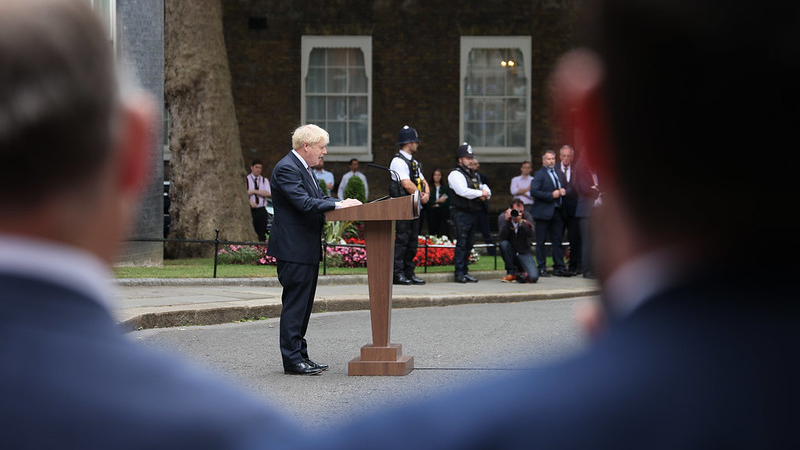This has been a long week in British politics: more than 50 cabinet resignations, the resignation (or possibly not) of the prime minister, the start of a brutal leadership campaign and the leader of the opposition found not guilty of breaking lockdown rules.
Boris Johnson has presided over a dismal period for UK assets which has seen sterling persistently weak and, until recently, a buyer’s strike on UK equities. Will his departure usher in a new era for UK investments?
Uncertainty is a friend to nobody
The immediate response of financial markets to his departure was positive. The pound briefly tipped over $1.20 and rose to €1.18. When Johnson became prime minister on 24 July 2019, the pound was worth $1.24 and €1.11.
The UK 10-year gilt yield dropped, which may have been a sign that investors were attributing less risk to UK government bonds, but this needs to be set against a global fall in bond yields.
While it is difficult to disaggregate the performance of UK stock markets from the rest of the world, it is worth noting that the more domestically-focused FTSE 250 outpaced the FTSE 100 in the immediate aftermath of Johnson’s announcement.
It is too early to read a lot into this tentative rally in UK assets. However, while financial markets usually hate uncertainty, it appeared that many investors saw this week as the beginning of the end of a difficult period.
Since the Brexit vote in 2016, UK assets have lived under a cloud of uncertainty that has deterred international buyers and kept UK asset prices lower. Under the current administration there seemed little chance of this ending, but under a less populist regime, a return to normality seems plausible.
Didier Borowski, head of global views at the Amundi Institute, says: “In normal circumstances, political uncertainty is bad news for an economy. But in the current context, the arrival of a new leader, with a more predictable and credible economic policy, could take the level of uncertainty down a notch.
“The UK’s economic outlook has deteriorated sharply since the start of the year. The risks of recession are further exacerbated by the economic consequences of Brexit.”
In other words, markets don’t fear more uncertainty because there was already an abundance of it. At the very least, a change of government raises the potential for greater stability.
Thaw in EU-UK relations more likely
Of course, a lot will depend on who wins an already ugly Conservative party leadership battle, which boasts no fewer than 11 hats in the proverbial ring.
Tax has been the first battle ground, with a number of the candidates pledging to make drastic cuts to kick-start the economy. The problem, their rivals point out, is that the UK is already in a weak fiscal position and any tax cuts risk sending inflation even higher without helping the people suffering most from the rising cost of living.
Either way, investors and UK companies alike will be hoping for a more benign business environment. The Johnson period has been characterised by poor relationships with the country’s closest trading partners, particularly the European Union.
This has made life difficult for small- and medium-sized businesses, that have had to battle increasing red tape, which has added to the cost of doing business.
James Penny, chief investment officer at Tam Asset Management, says: “It’s likely Johnson’s successor will have a softer stance on Europe and Brexit negotiations, boosting positivity for UK domestic businesses found in the mid and small cap space which have been battered as of late.
“This could be further boosted if the successor manages to right the UK ship and thus stabilise the pound, which would boost domestic businesses in the FTSE 250 and AIM.”
Borowski agrees: “At the end of the day, the PM’s succession could pave way for an improvement in UK-EU relations. Most candidates – even those who were in favour of Brexit – are less confrontational than Johnson on Europe.
“In particular, it is unlikely that the next PM will want to violate international law, as Johnson did, by proposing legislation to amend the Northern Ireland Protocol of the post-Brexit treaty negotiated with the EU. A normalisation of relations with the EU on this issue would certainly be welcomed by investors.”
Collision of inflation with the cost-of-living crisis
Domestically, UK businesses will be keen to get back to the business-friendly policies that have historically characterised Conservative governments.
A number of the candidates, including Jeremy Hunt and Nadhim Zahawi, have suggested reversing the planned increase in corporation tax, due to come in April 2023.
However, perhaps more than anything, UK businesses will welcome a firm hand on the economic tiller.
Penny says: “The crossroads of inflation and the cost-of-living crisis are also likely to be more clearly managed going forward. Both should boost the pound and boost domestic asset prices.
It may also encourage the Bank of England to be less cautious on interest rates. If the new government is more fiscally prudent, the Bank of England may not feel the need to raise rates as fast or as vigorously.”
There is some way to go before this difficult political period has played out. There are still candidates on the short list who would put short-term populism ahead of long-term economic stability.
Investors can only hope that the Conservative Party has ended its flirtation with this style of government and international investors can once again put their faith in British assets.











